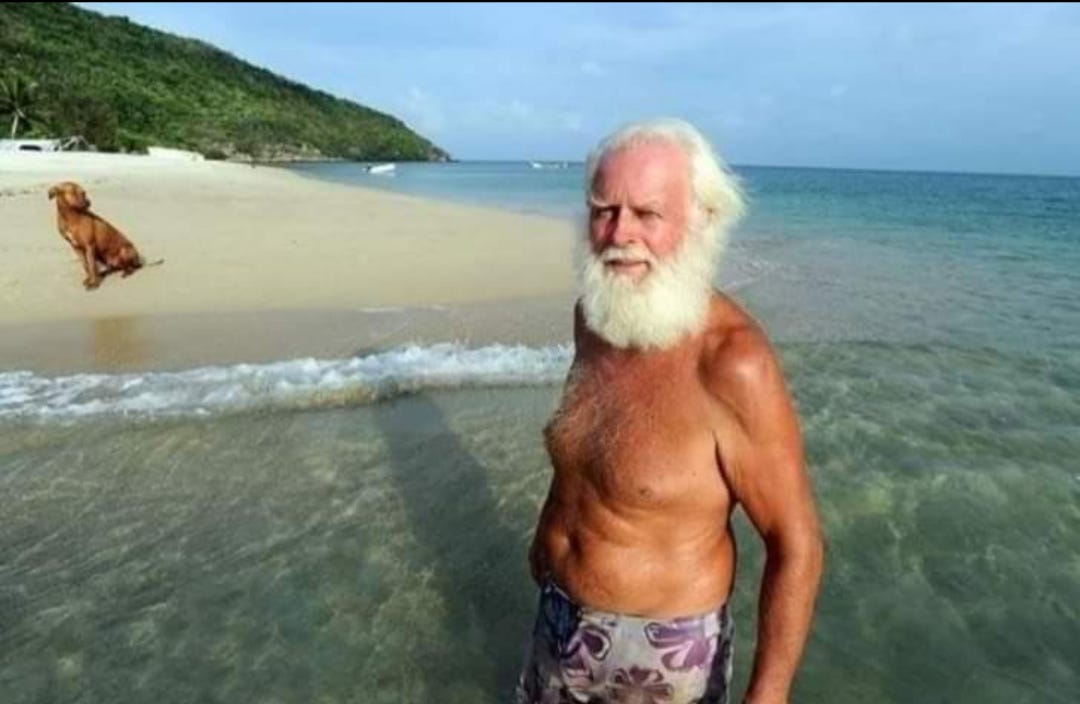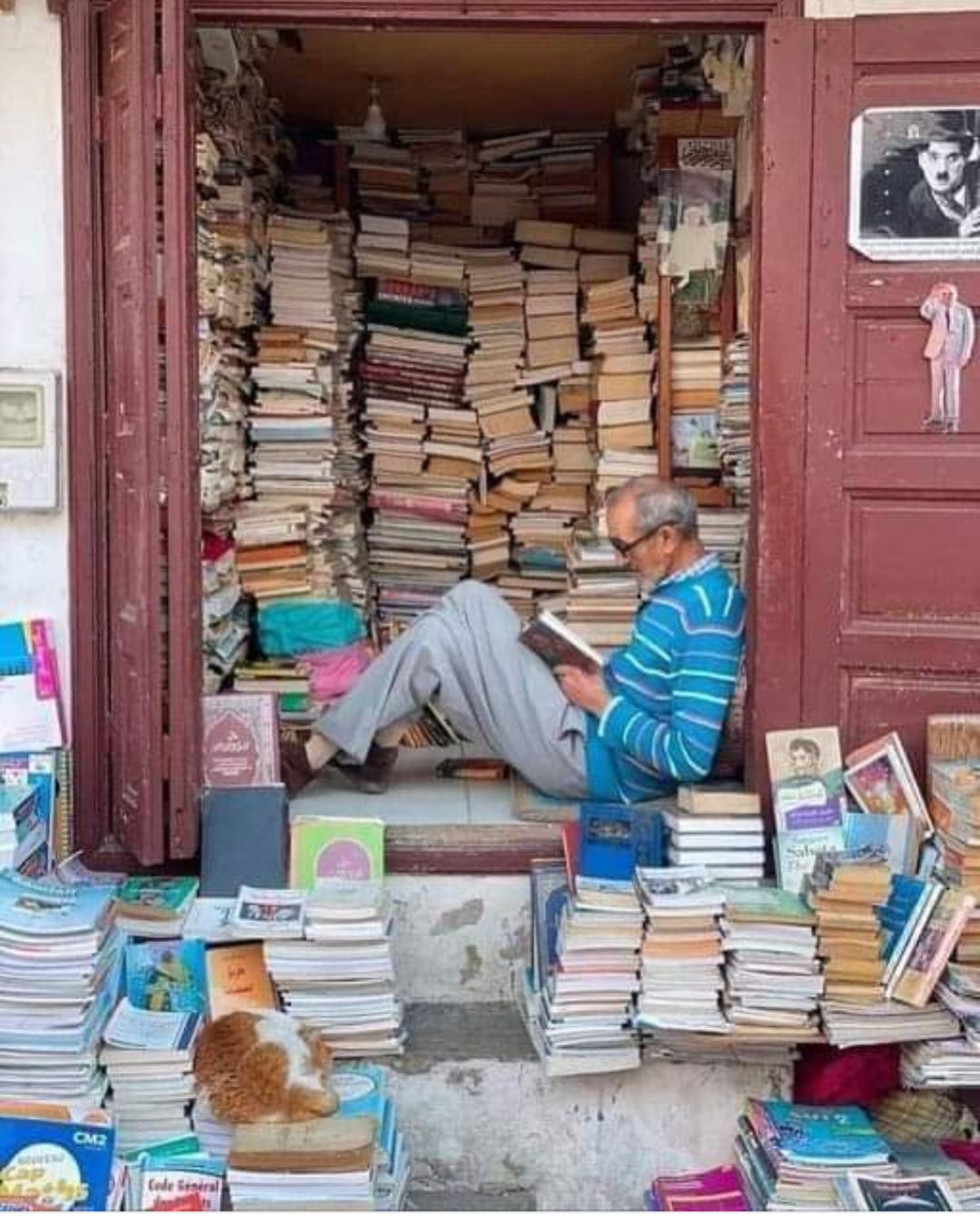Reflections for a Sunday: Who are the Unsung Heroes?
“I have read more than 4,000 books in Arabic, French, English or Spanish, so I have lived more than 4,000 lives." ~ Mohamed Aziz
“But ask the beasts, and they will teach you; the birds of the heavens, and they will tell you; or the bushes of the earth, and they will teach you; and the fish of the sea will declare to you. Who among all these does not know that the hand of the Lord has done this? In his hand is the life of every living thing and the breath of all mankind.” Job 12: 7-10
You can listen to me read this essay here:
There is no more perfect balance than Nature and Books.
One-time or recurring donations can now be made at Ko-Fi
Brendon Grimshaw bought an island and gave everything he had instead of taking everything it had.
For thirteen thousand dollars, Englishman Brendon Grimshaw bought a tiny uninhabited island in the Seychelles and moved there forever. When Grimshaw was under forty, he quit his job as a newspaper editor and started a new life. By this time, no human had set foot on the island for 50 years.
Along with a friend, Rene Lafortin, Brendon began to equip his new home. While René came to the island only occasionally, Brendon lived on it for decades by himself, never leaving. Over the course of thirty-nine years, Grimshaw and Lafortin planted sixteen thousand trees with their own hands and built almost 5 kilometers of paths. In 2007, Rene Lafortin died, and Brendon was left all alone on the island. He was 81 years old. He attracted 2,000 new bird species to the island and introduced more than a hundred giant tortoises, which in the rest of the world (including the Seychelles) were already on the verge of extinction.
Thanks to Grimshaw's efforts, the once deserted island now hosts two-thirds of the Seychelles' fauna. An abandoned piece of land has turned into a real paradise. A few years ago, the prince of Saudi Arabia offered Brendon Grimshaw $50 million for the island, but he refused.
“I don’t want the island to become a favorite vacation spot for the rich. Better let it be a national park that everyone can enjoy.” And he achieved just that. In 2008 the island was indeed declared a national park. ~ National Geographic Nature
Grimshaw bought the island, but he didn’t “own” it. He was a good steward of the land, like we are all supposed to be.
He didn’t build a holiday resort and a lot of condos. He didn’t start bottling the water in plastic and selling it for exorbitant prices. He didn’t build a mansion for himself and invite all his cool friends to come and party—because when you have something other rich people want, suddenly you have lots of cool friends.
He didn’t behave like a normal island owner. There are plenty of islands all over the world, owned by billionaires who would like us to believe they care about the environment, but they can’t hold a candle to Brenden Grimshaw. If we just talk about Hawaii here’s a few examples:
Larry Ellison
Oracle co-founder Larry Ellison is perhaps the most notable billionaire with Hawaiian investments. In 2012, he purchased 98% of the island of Lanai for a reported $300 million. Since then, Ellison has invested in various development projects on the island, including luxury resorts and renewable energy initiatives.
Mark Zuckerberg
Facebook CEO Mark Zuckerberg has also shown a keen interest in Hawaii. He and his wife, Priscilla Chan, have spent over $100 million acquiring land on the island of Kauai. Their purchases include a 700-acre estate in Kilauea and additional land in the Pila’a Beach area. He’s also building a massive underground bunker.
Oprah Winfrey
Media mogul Oprah Winfrey owns several properties in Hawaii, including a 163-acre estate in Maui’s Upcountry region, which she purchased in 2002. She has since bought additional land in the area, expanding her estate and enhancing its privacy and security.
Jeff Bezos
Amazon founder Jeff Bezos is another billionaire who has invested in Hawaii. While details of his purchases are more private, reports suggest that Bezos owns a secluded estate in Maui, adding to his extensive real estate portfolio.
Michael Dell
Dell Technologies founder Michael Dell owns the Four Seasons Resort Maui at Wailea, which he acquired in 2004. The luxury resort is part of his extensive real estate holdings and reflects his interest in premium hospitality properties.
How about the pure, fresh water that comes from islands.
Water promises to be to the 21st century what oil was to the 20th century: the precious commodity that determines the wealth of nations. Fortune magazine.
Just two companies, Vivendi Universal and Suez control over 70 percent of the existing world water markets. Fiji water isn’t owned by the people of Fiji, it’s own by an American conglomerate, The Wonderful Company. You can find out more about these companies in my revealing essay Who Owns Everything?
A savior of another sort is Mohamed Aziz, a savior of books.
72-year-old Mohamed Aziz from the city of Rabat, Morocco is the most photographed bookseller in the world. But that’s not what’s important.
Selling books in a country where 26% of the population still cannot read is an act of love for the city and literature. Orphaned since the age of 6, Aziz had a hard life; he couldn't even finish high school because the textbooks were too expensive for him.
In 1963, at the age of 15, he started his career as a bookseller, only on a carpet under a tree with 9 books.
He now sells thousands of books in his bookstore and spends his days immersed in books devouring their stories.
He reads 6-8 hours a day and only stops to eat, pray, smoke and help customers. In his free time, he walks around the neighborhood looking for books, which he later sells in his shop.
He says this is his revenge against his childhood and poverty: “I have read more than 4,000 books in Arabic, French, English or Spanish, so I have lived more than 4,000 lives. Everyone should have this opportunity! All I need is two pillows and a book to enjoy my birthday.”
He is the longest-serving bookseller in Rabat, working in the same place for more than 43 years.
When asked why he leaves his books unattended outside where they can be stolen, he replied that those who cannot read do not steal books and those who can are not thieves.
When I read this story, it took me back to Morocco and all the adventures I’ve had there over the years. As a child, I was fascinated by the little shops and the shopkeepers. It was in the Medina of Fes, at the age of ten, that I purchased what I was sure was a magic bottle with a genie inside. But that’s another story that I told in The Bloodsuckers.
Reading takes you to marvelous and varied locations like Grimshaw’s island or some futuristic city built on Mars. Thank God for people like Grimshaw and Aziz. Grimshaw wouldn’t sell his island for all the money in the world and Aziz could care less about expanding his little shop into a chain of bookstores around the world.
Grimshaw and Aziz just happened to have been found out and stories have been told about them. It bears mentioning that I know neither of them personally. I only know the stories told about them. Perhaps there is another side to their stories. But I use them as examples of others who are even more important. The countless unsung heroes who live and die in obscurity. Outside of their little communities, nobody knows about them. They aren’t rich and famous and such things mean nothing to them. No one will ever write an epic tale about their courage or self-sacrifice. But without these heroes the world would descend into darkness.
As it is, they are the ones who keep the light burning bright.






Love this.
Yes, wonderful accounts to remind us of what came into my mind as I was ending my walk today; that for all the pain and sorrow of this life, the Earth is a wonder and life on it still filled with beauty.